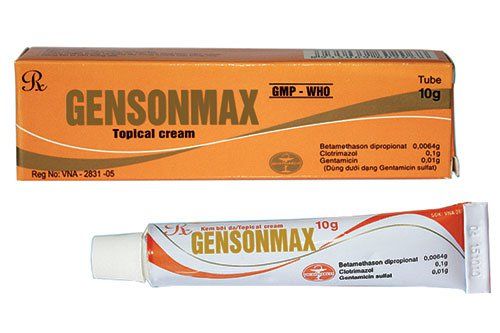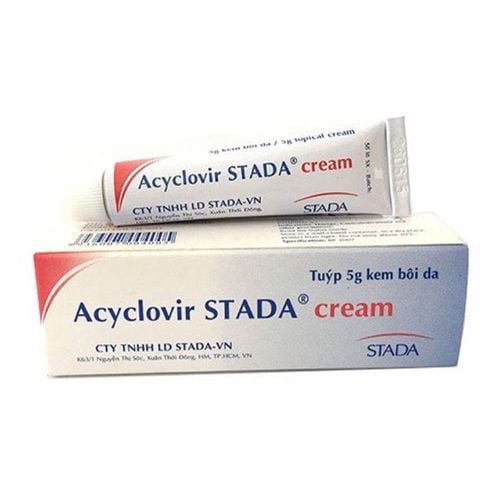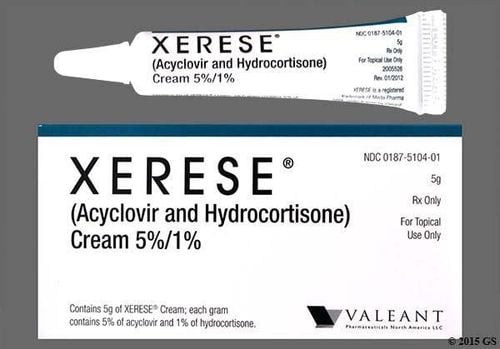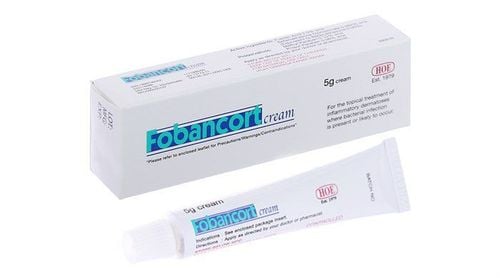This is an automatically translated article.
The article was professionally consulted with Master, Doctor Vu Quoc Anh - Pediatrician - Department of Pediatrics - Neonatology - Vinmec Danang International General Hospital.Children with cold sores, also known as cold sores, usually appear on the mouth near the lips. The herpes simplex virus is the main cause of cold sores. Most children with cold sores will heal on their own with good care and hygiene. However, children will carry the virus for life in two forms: silent or periodic outbreaks.
1. What disease does a child with cold sores have?
Cold sores, also known as cold sores, are small, fluid-filled blisters that often appear near or on the lips. The sores may be clustered or located individually or in clusters. Despite its name, cold sores are not related to colds.Accordingly, it is necessary to distinguish cold sores and canker sores with the characteristic that the mouth of canker sores looks like a volcano and they are often scattered on the tongue, gums or inside the cheeks.

2. Causes of cold sores
The herpes simplex virus is the cause of cold sores. Herpes simplex virus has 2 types, in which, type 1 causes cold sores, and type 1 causes genital herpes, or can also cause sores on the face and genitals.3. How contagious are cold sores?
People infected with the herpes simplex virus can present as cold sores or gingivitis. Most adults infected with the herpes simplex virus were infected as children, through transmission routes such as:Sharing cups, dishes, utensils or toys with an infected child/person. Being kissed and exposed to the saliva of an infected person (with or without symptoms). Transmitted from an infected mother to her baby through vaginal delivery. However, cold sores in babies are not transmitted through breast milk when an infected mother is breastfeeding.

4. What symptoms do children with cold sores have?
A child with primary cold sores (i.e. first infection with the herpes simplex virus) will have the following symptoms:blisters that grow all over the mouth and cause mouth pain Gingivitis The child may have a fever, sore throat, and swollen lymph nodes The main symptoms of cold sores can be mild, and sometimes children may not even know they have the virus. After about 10-14 days, cold sores can go away on their own, however, children remain infected with the virus for life. When present in the body, the virus will manifest in two forms, one is silent, causing no symptoms, or appearing periodically with the manifestation of cold sores.
During episodes of secondary cold sores, the child may not have swollen gums, fever, sore throat or lymph nodes, but cold sores may swell near or on the lips.
5. Are cold sores in children dangerous?
Cold sores in the mouth are not dangerous, but if the herpes simplex virus spreads to other parts of the body, it can be dangerous.It is not normal for babies to have cold sores in the first six months of life, because during this period the baby receives antibodies from the mother to help protect the baby against external agents. Therefore, if a child under 3 months old is infected with the herpes simplex virus that causes mouth sores, parents need to take the child to see a doctor soon, to prevent the virus from spreading to the brain as well as other organs, causing serious damage and possible damage. can leave permanent sequelae or even lead to death.
When a child has cold sores, avoid touching their eyes because if the virus gets to the eyes (called ocular herpes) it can lead to a serious eye infection. At that time, if a child has pain above the eyelid or on the surface of the eye, parents need to take the child to see a doctor immediately so that he can be treated with antiviral drugs to prevent infection. does not leave scars on the cornea. In other rare cases, eye herpes can weaken and cause blindness.
6. Treatment of cold sores in children
Most cold sores in children will go away on their own. While waiting for the sores to heal, parents can do the following to help reduce discomfort:Apply a cold washcloth or a cool washcloth to the cold sore area to reduce redness. Children 6 months of age and older can be given an appropriate dose of a mild pain reliever (eg, acetaminophen or ibuprofen). However, regardless of age, parents should be cautious about giving pain relievers to their children. If necessary, please consult and prescribe from a doctor, especially when the baby is under 3 months old. Absolutely do not give aspirin to children because it can cause Reye's syndrome, affecting the child's life. When children have cold sores, it is necessary to avoid giving them foods or fruits that contain a lot of acid such as oranges and tangerines because they can make the child feel more pain at the site of the acne. Over-the-counter ointments can be given to children to help relieve pain and heal cold sores. However, for children under 12 months of age, it is necessary to consult a doctor before using over-the-counter ointments to ensure safety for the child. If your child has severe cold sores, the doctor may prescribe an antiviral topical or oral medication. If cold sores cause pain and the child cannot eat or drink, parents need to see a doctor immediately.
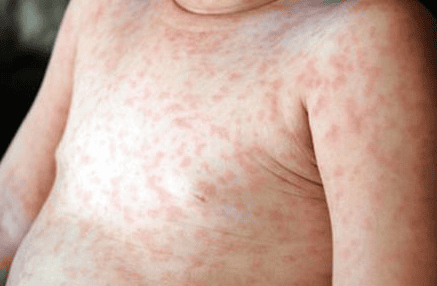
7. Prevention of cold sores in children
An infected open sore on the lip is an opportunity for the virus to enter and cause illness. Therefore, to prevent the virus that causes cold sores in children, it is important to note the following:If adults have herpes, avoid kissing children, especially babies, until the cold sores have completely healed. Do not share personal utensils, eating utensils such as glasses, cups, cups, chopsticks, ... in common. If your child has a cold sore, it is important to wash your child's hands often, keep the child from touching the cold sore, and do not share toys and eating utensils with other children because it can spread the virus. kiss other children, especially babies. Protect your child from the sun with a wide-brimmed hat or lip balm when out in the sun to reduce the risk of a flare-up when your child has the virus. The herpes simplex virus is the cause of cold sores in babies, and can be transmitted from mother to child at birth or through kissing or contact with an infected person. The disease is also transmitted by sharing personal utensils or eating utensils with an infected person.
Cold sores can leave dangerous complications for children if not examined and treated promptly. Therefore, when seeing a child showing symptoms of the disease, parents should soon take the child to a medical center for examination and treatment, to avoid dangerous complications that may occur.
Vinmec International General Hospital is the address for receiving and examining respiratory diseases that infants and young children are susceptible to: viral fever, bacterial fever, respiratory infection, pneumonia in children, .... With modern equipment, sterile space, minimizing the impact as well as the risk of disease spread. Along with that is the dedication from the doctors with professional experience with pediatric patients, making the examination no longer a concern of the parents.
Customers can directly go to Vinmec Health system nationwide to visit or contact the hotline for support
Please dial HOTLINE for more information or register for an appointment HERE. Download MyVinmec app to make appointments faster and to manage your bookings easily.
Reference source: babycenter.com




